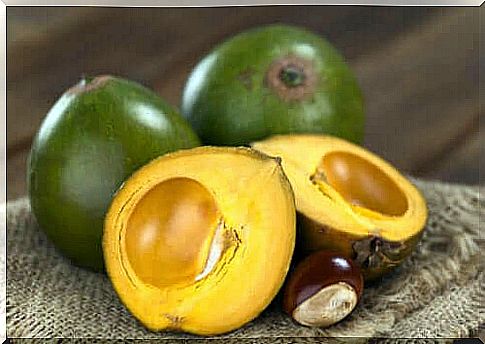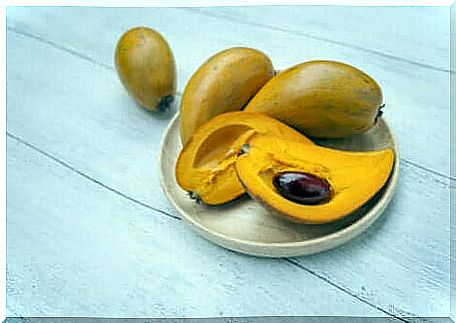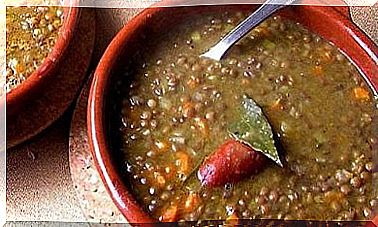Lucuma And Its Health Benefits
If you haven’t heard of lucuma yet, don’t miss this article on this exotic fruit with an incredible amount of essential micronutrients .

You may never have heard of it. That is why today we want to talk to you about lucuma. This fruit comes from a tree that grows on the lands of Peru. It is used for the preparation of sweet recipes, due to its exquisite taste.
Their resemblance to avocado is striking as they share the same skin color, as well as a large stone inside. It is a fleshy fruit whose interior is yellow, or even orange. Its consumption may provide certain health benefits. We detail them in this article.
Origin and uses of lucuma
Lucuma is, as we have said, a fruit that comes from a tree: the lucume. It is characterized by its large size and the light color of its wood.
On the other hand, it grows wild in the Andean valleys and thrives best in temperate climates. It does not require a constant and excessive supply of water, and therefore adapts well to times of drought.
Lucuma comes from this tree and is usually eaten when very ripe. To guarantee its conservation, it must be wrapped in a protective material once it is picked. Its flavor is sweet and shares some nuances with maple syrup. It is therefore commonly used in the preparation of confectionery recipes.

Benefits of lucuma
This fruit is characterized by its content of iron, beta-carotenes and niacin. So much so that its regular consumption offers a set of health benefits associated with these components.
Although the iron it contains is of plant origin and therefore has a lower rate of assimilation, ingestion of this nutrient reduces the risk of developing pathologies such as anemia. In addition, it is always best to consume iron with a dose of vitamin C to promote its absorption.
In addition, it is necessary to underline the presence of beta-carotenes in lucuma. These nutrients are active forms of vitamin A. The latter manages to reduce the risk of developing certain complex diseases such as liver pathologies. This is shown in research published in the journal Nutrition and Health.
On the other hand, special mention should be made of the niacin content of lucuma. Current scientific data confirms that this substance has beneficial effects on the prevention of dyslipemia when ingested in adequate doses. It is a water-soluble vitamin. It is therefore necessary to consume enough water every day.
In summary, regular ingestion of lucuma can be helpful for the following reasons:
- Prevention of iron deficiency anemia.
- Improved liver function .
- Reduced risk of developing dyslipemia.
How to consume lucuma?
In many countries, it can be difficult to find lucuma, as it is consumed regularly only in certain South American countries. However, if you do manage to buy this fruit, be aware that the pulp is usually not eaten in its natural state. Ideally, the fruit should be slightly processed in order to take full advantage of its organoleptic qualities.
Lucuma pulp does indeed have a high starch content and is often used in preparations such as smoothies or creams. Usually this fruit is best for sweet recipes. It is rarely found in savory dishes.

An unusual sweet fruit
As we mentioned, lucuma is a fruit from South America that grows under specific climatic conditions. It is consumed at very great maturity and must always be lightly treated beforehand. Its natural pulp is not usually eaten.
On the other hand, its regular ingestion provides various health benefits. It is a food that contains micronutrients essential for the functioning of the body. It is particularly useful for improving liver function.
However, it should not be abused because lucuma contains a significant amount of sugars. The best is to introduce it into a balanced and varied diet.
On the other hand, it is a healthy option to replace the simple sugar added in desserts with lucuma pulp. This ingredient will also provide a good texture as well as an intense sweet taste similar to that of maple syrup or certain sweeteners.
It can be used in creams, ice creams, cakes and even smoothies. Finally, lucuma goes perfectly with bitter cocoa and other foods typical of pastry recipes.









